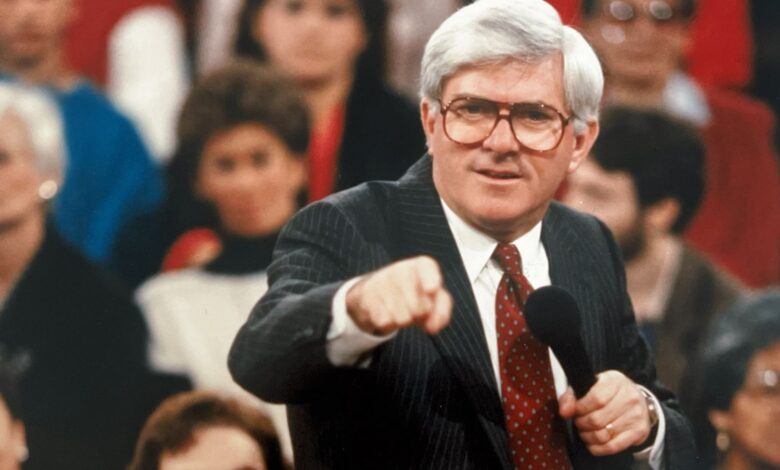Phil Donahue: The Trailblazing Talk Show Host Who Redefined Television
Phil Donahue: The Trailblazing Talk Show Host Who Redefined Television

Phil Donahue is a name synonymous with groundbreaking television. As a pioneer of the talk show format, Donahue’s career has been marked by his innovative approach to broadcasting and his ability to engage audiences with compelling, often controversial topics. This article delves into Phil Donahue’s career, his contributions to television, and the lasting impact he has had on the medium.
Early Life and Career Beginnings
Born on December 21, 1935, in Cleveland, Ohio, Phil Donahue’s journey to becoming a television icon began with a fascination for media and communication. He attended the University of Notre Dame, where he studied business and then pursued a career in radio and television. His early career was marked by a series of positions in local radio and television, which provided him with the foundational experience necessary to launch his own show.
Donahue’s initial foray into television came with the creation of the show “The Phil Donahue Show” in 1967. Initially, the show was broadcast locally on Cleveland’s NBC affiliate, but its success soon caught the attention of national networks.
Breaking New Ground: The Phil Donahue Show
1. Revolutionary Format:
What set “The Phil Donahue Show” apart from other talk shows was its innovative format. Unlike the more entertainment-focused talk shows of the era, Donahue’s program was dedicated to serious, in-depth discussions on a wide range of social and political issues. His approach was characterized by a willingness to address controversial topics, from civil rights and gender equality to mental health and drug abuse.
Donahue’s format included a mix of interviews, audience participation, and live discussions, creating a dynamic and engaging viewing experience. This interactive format allowed viewers to participate directly in the conversation, a novel concept at the time. The show’s emphasis on open dialogue and diverse viewpoints set a new standard for talk shows and influenced countless subsequent programs.
2. Landmark Interviews:
Throughout its run, “The Phil Donahue Show” featured a myriad of high-profile guests and landmark interviews. Donahue was known for his ability to attract influential figures from various fields, including politicians, activists, and celebrities. His interviews often delved deeply into personal and societal issues, providing viewers with insightful and sometimes provocative content.
One of the show’s most memorable moments came in 1975 when Donahue interviewed feminist icon Gloria Steinem. The discussion focused on gender equality and women’s rights, capturing the essence of the show’s commitment to addressing important social issues.
Legacy and Influence
1. Redefining Talk Television:
Phil Donahue’s impact on talk television cannot be overstated. His willingness to tackle challenging subjects and engage in meaningful dialogue set a precedent for future talk show hosts and television programs. The success of “The Phil Donahue Show” demonstrated that television could be more than just entertainment; it could be a powerful medium for exploring important social issues and fostering public discourse.
Donahue’s approach to television paved the way for other talk show hosts who sought to blend entertainment with substantive content. Programs such as “Oprah Winfrey,” “Larry King Live,” and “Jerry Springer” drew inspiration from Donahue’s innovative format, incorporating elements of audience interaction and in-depth discussion.
2. Cultural Impact:
Donahue’s influence extended beyond the realm of television. His show often featured discussions on contemporary issues that were shaping American society. By bringing these issues to a broad audience, Donahue played a role in raising awareness and fostering discussion on topics such as LGBTQ+ rights, environmental concerns, and political activism.
His approach to addressing controversial issues and providing a platform for marginalized voices contributed to a more open and inclusive public discourse. Donahue’s legacy is reflected in the way modern media continues to address complex social and political topics, often inspired by his groundbreaking work.
Post-Talk Show Career
1. Returning to Television:
After “The Phil Donahue Show” ended its original run in 1996, Donahue continued to make significant contributions to television. He hosted a series of other programs, including “Donahue” (1999-2003), which was a return to his talk show roots. Although this later iteration did not achieve the same level of success as the original show, it demonstrated Donahue’s enduring commitment to engaging in important societal conversations.
2. Advocacy and Public Speaking:
Beyond television, Donahue has been active in various forms of public advocacy and speaking engagements. He has been a vocal advocate for issues such as media reform, political transparency, and social justice. His work in these areas has further cemented his reputation as a thoughtful and influential commentator on contemporary issues.
Donahue has also authored several books, including “The Whole Truth: A Memoir of Faith, Family, and the American Dream,” which reflects on his life and career. His writings provide insight into his perspectives on media, society, and personal growth.
Challenges and Criticisms
Despite his successes, Donahue’s career was not without its challenges and criticisms. The latter years of “The Phil Donahue Show” faced declining viewership, partly due to changing media landscapes and evolving viewer preferences. The show’s departure from its original format and its struggle to maintain relevance in a rapidly changing television environment were significant challenges.
Additionally, Donahue faced criticism from some quarters for his sometimes confrontational style and his focus on controversial subjects. While his approach was praised for its candor and bravery, it also attracted criticism from those who felt that the show’s content was too provocative or sensationalistic.
Conclusion
Phil Donahue’s contributions to television have left an indelible mark on the industry. As a trailblazing talk show host, he revolutionized the format by introducing a new approach to engaging with social and political issues. His innovative style, commitment to meaningful dialogue, and willingness to tackle challenging subjects set a standard for talk television and inspired future generations of broadcasters.
Donahue’s legacy is a testament to the power of television as a medium for public discourse and social change. Through his pioneering work, he demonstrated that television could be a platform for addressing important issues and fostering a more informed and engaged society. As media continues to evolve, Phil Donahue’s impact remains a significant chapter in the history of television, reflecting his enduring influence on the medium and its role in shaping public conversations.



